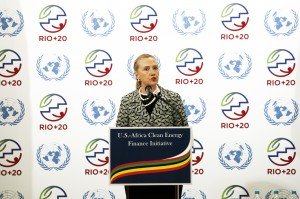
Rio+20: Lessons Learned or Missed Opportunities?
 Before the Rio+20 Earth Summit began, many had already labeled it as a “failure” because of the watered down conference document, The Future We Want. Activists had hoped it would be full of strong, action-filled language and a clear plan for the future but it failed to deliver any binding agreements. This document took months to negotiate, cut out language about many fundamental issues, and made clear the lack of individual governments’ leadership and a general lack of vision. From this, it would be easy to conclude that the conference was a complete failure because all that came of it was the decision to have another meeting in the future. Despite this, there are some positive lessons to be learned from Rio+20. The following list lays out what was achieved at the conference and what was not:
Before the Rio+20 Earth Summit began, many had already labeled it as a “failure” because of the watered down conference document, The Future We Want. Activists had hoped it would be full of strong, action-filled language and a clear plan for the future but it failed to deliver any binding agreements. This document took months to negotiate, cut out language about many fundamental issues, and made clear the lack of individual governments’ leadership and a general lack of vision. From this, it would be easy to conclude that the conference was a complete failure because all that came of it was the decision to have another meeting in the future. Despite this, there are some positive lessons to be learned from Rio+20. The following list lays out what was achieved at the conference and what was not:
Missed opportunities:
Despite energy being widely discussed, the conference failed to deliver significant, binding commitments on sustainable energy. This has been an ongoing point of contention, having failed to reach an agreement at Durban in 2011 and Copenhagen in 2009.
The leaders of the US, Britain and Germany were absent, which caused many to question their dedication to sustainability.
Some of the biggest activists had their plans cut from the document, which included a call to end subsidies for fossil fuels, language underscoring the reproductive rights of women, and a treaty to protect ocean biodiversity.
Participants “reaffirmed” many things in the document but gave no mandates on how to get there. The need to achieve sustainable development was “reaffirmed” as well as the commitment to strengthening international cooperation. The word “reaffirm” was used 59 times in a 49-page document.
Positive steps forward:
The public/private partnership manifested itself at Rio+20, where multinational corporations played a large role in financing sustainability projects. Bank of America pledged $50 billion over the next 10 years to address climate change, sustainability and energy efficiency.
Many multilateral development banks committed a total of $30 billion to finance sustainability initiatives.
The US announced the US-Africa Clean Energy Finance Initiative, which leaders hope will spur the development of clean energy projects with the increased availability of financing and loans through the Overseas Private Investment Corporation (OPIC).
The UN launched a “Zero Hunger Challenge”, backed by the U.N. Food and Agriculture Organization, the International Fund for Agricultural Development (IFAD), the World Food Programme (WFP), the U.N. Children’s Fund (UNICEF), the World Bank and Bioversity International. The program challenges countries to work together to end hunger and has 5 goals, including 100% access to adequate food all year around, ending malnutrition in pregnancy and early childhood and making all food systems sustainable.
Despite the gloomy mood emerging from the conference, there was some optimism from individual countries, communities and companies from around the globe that are taking action irrespective of a UN mandated document. Mexico’s President recently enacted climate change legislation that set binding targets, making them the first developing country to do so. Other developing countries announced an agreement to phase out incandescent light bulbs, while Australia and other coastal countries committed to protecting their seas. These actions prove that countries are willing and eager to move towards sustainable development, even without UN mandated legislation.
Overall, the Rio+20 Earth Summit was not a failure but another step towards global cooperation for sustainability. It shined a spotlight on the environmental and sustainable development issues we know we must address. Despite no binding commitments, moderate progress was made and the conference may have bolstered momentum individually among countries that otherwise would have been overshadowed by an international agreement. In the end, though, this conference proved that negotiating with broad and diverse actors on such a large stage is extremely difficult and often leads to few decisions being made.






[…] Rio+20: Lessons Learned or Missed Opportunities? […]